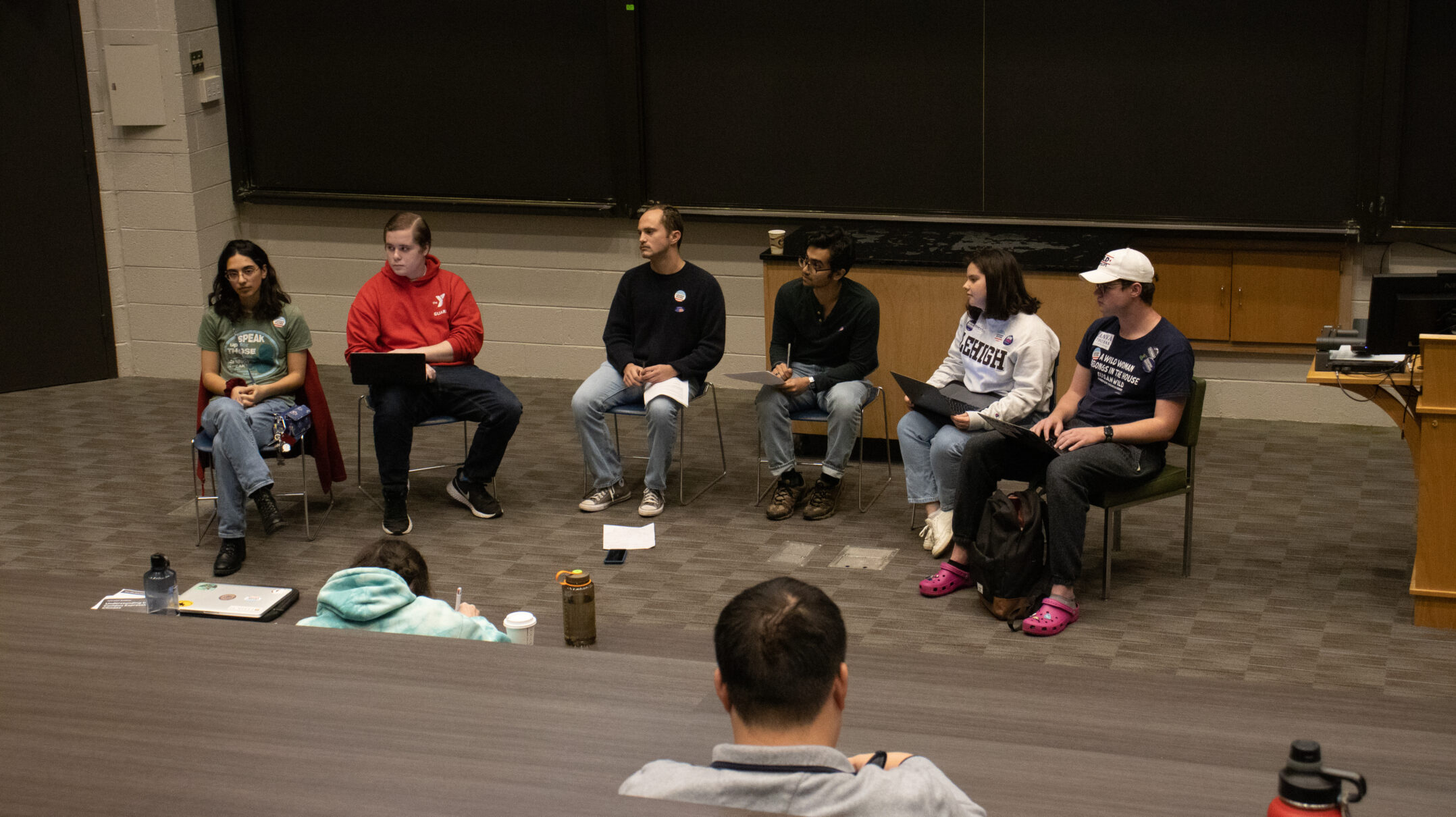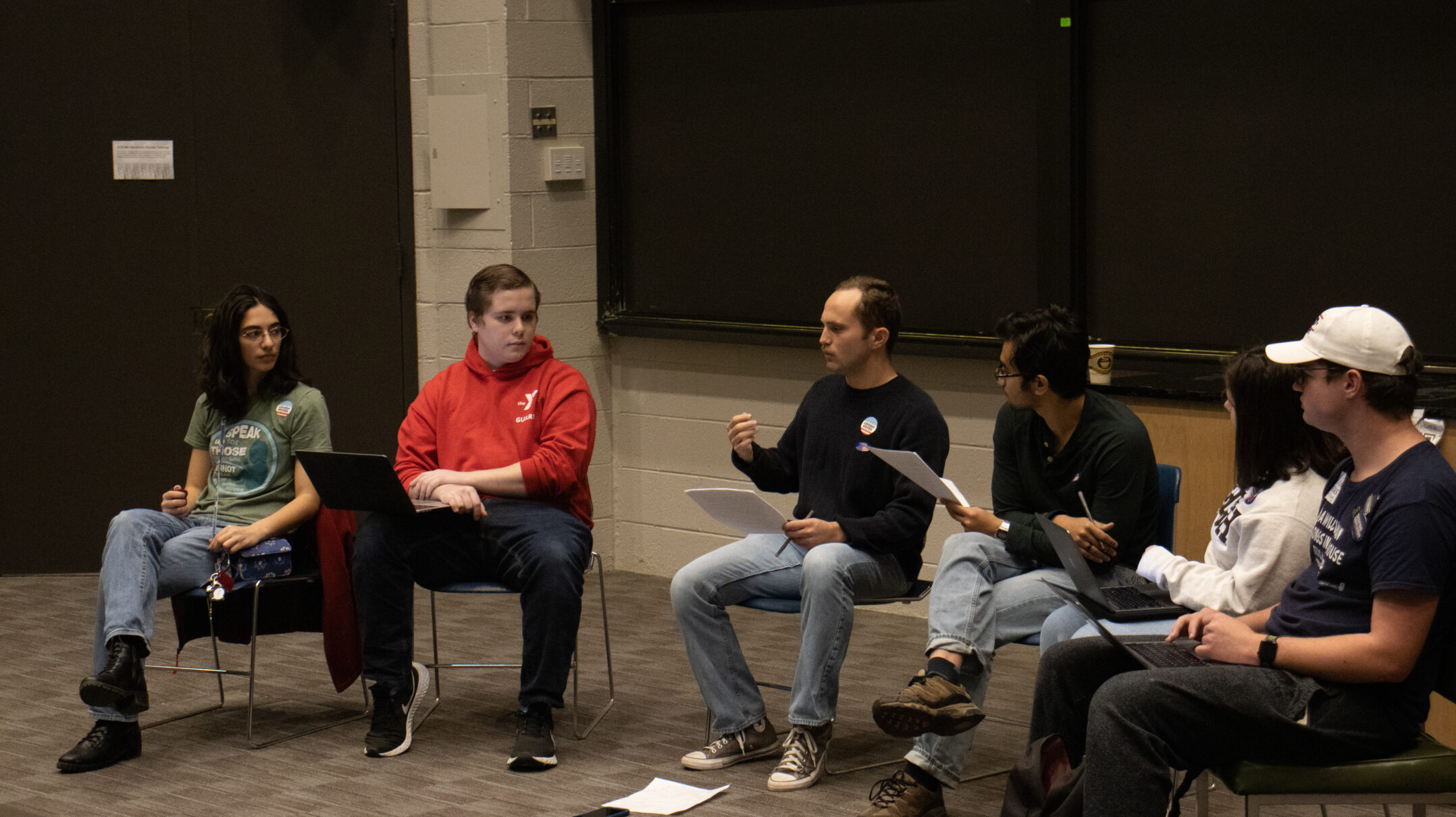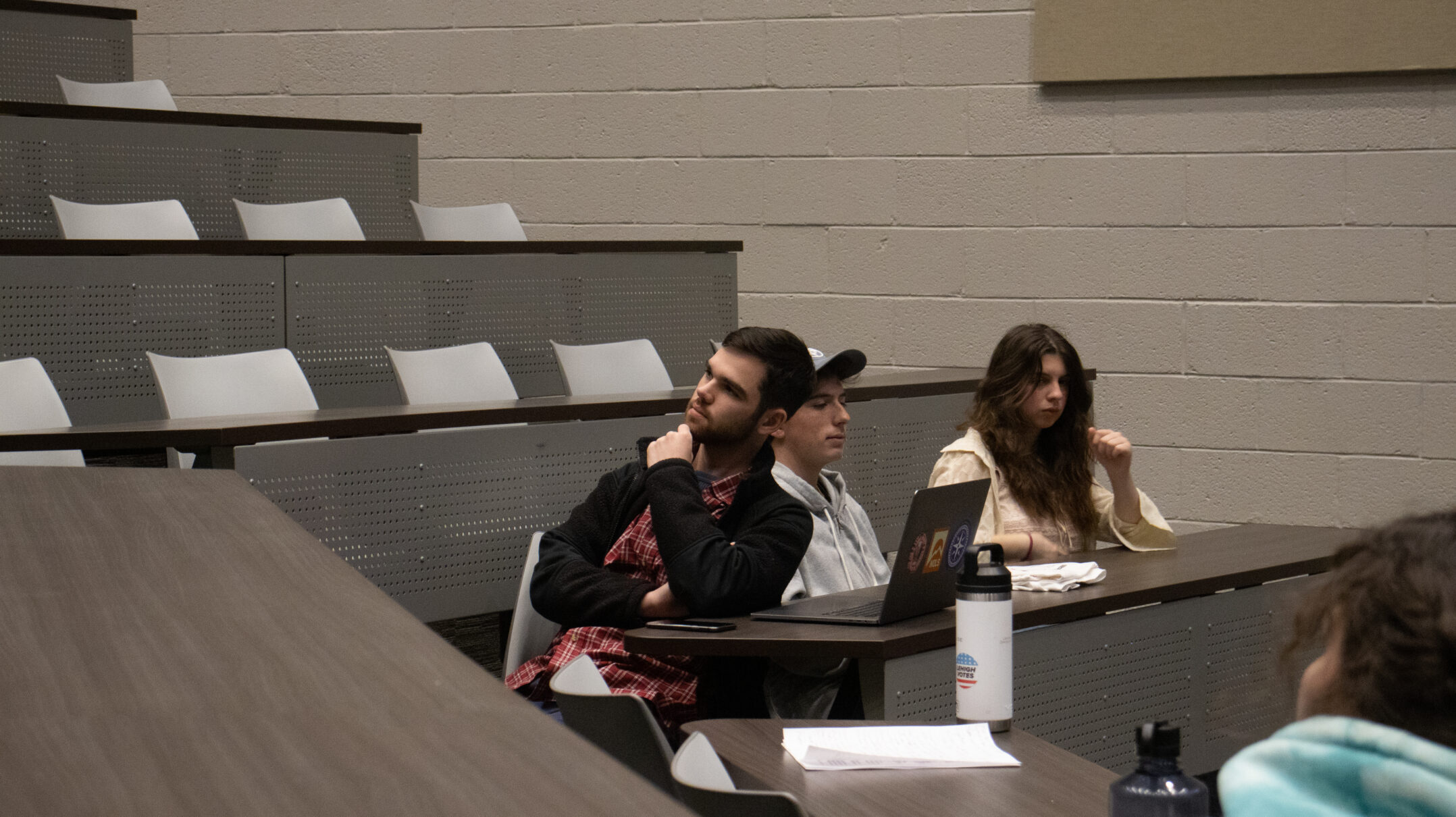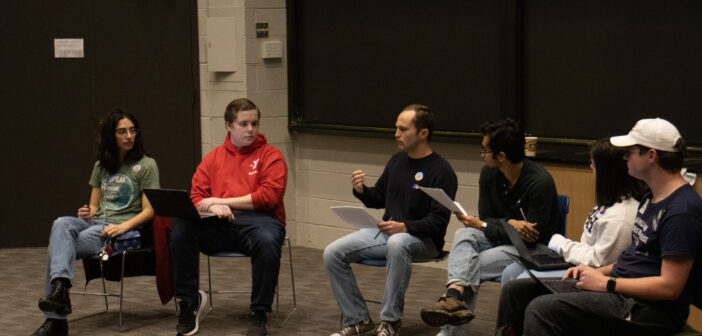The Lehigh College Republicans and Democrats debated self-censorship and free speech on campus at Neville Hall on Tuesday.
The debate was part of programming for Lehigh’s Civic Engagement Day. Other events included political science professor Brian Fife’s talk about the consequences of elections.
The debate panel consisted of Marietta Sisca, ‘23, vice president of Lehigh Republicans; Stephen Kelly, ‘24, president of Lehigh Republicans; Miranda Asral, ‘23, vice president of Lehigh Democrats; and Sam Denison, ‘24, president of Lehigh Democrats.
Declan Coster, ‘23, vice president and co-founder of The Douglass Dialogues, moderated the event with Raihan Alam, ‘23, the club’s president and other co-founder.
Coster, one of the key organizers of Civic Engagement Day, said being civically engaged is much more than just walking into a poll booth and checking off boxes for candidates.

The debate between the Lehigh College Republicans and Democrats focused on free speech and self-censorship on college campuses. The debate was held on Civic Engagement Day on Nov. 8. (Nahjiah Miller/Photo Editor)
“If we are going to make our community better and more active in voting, having those conversations is probably more important than just voting yourself,” Coster said. “The change we’re looking at in our community at Lehigh is going to require years of people being more and more invested in what the trajectory of our community looks like. … Having these conversations is the backbone of that progression.”
Coster helped choose free speech as the debate topic. He said he wanted to make sure the topic was something both sides would be willing to engage with.
The College Democrats and Republicans debated gun control last year, and abortion two years ago.
Asral, also involved in choosing the topic, said free speech was chosen over other hot-button issues because it is more relevant to college students’ experiences in the classroom.
At the beginning of the debate, Kelly told a story about presenting a view that differed from his personal beliefs for an essay in order to receive a better grade. He said he knew if he gave his true opinion on the matter at hand, he would get a lower grade.
“I feel like there is this sense that students are pressured by teachers and by academic institutions to censor themselves or lie where they can’t express their true opinions,” Kelly said.
Asral said she has not had a similar experience, nor does she know many other people who have.
“In an academic setting where you’re assuming that professor is an expert in their field, that is more of a reflection of your opinions,” Asral said.
Kelly said he tends to not bring up politics in conversation, but he doesn’t think that’s the way things should be.
“We should be mature enough to have adult conversations with topics you may not feel comfortable with with other people,” Kelly said. “There should be a space for it. I’m not sure if it’s everywhere. It should be in a structured setting.”

From left to right: Marietta Sisca, ’23, Stephen Kelly, ’24, Declan Foster, ’23, Raihan Alam, ’23, Miranda Asral, ’23, and Sam Denison, ’24. The club leaders engaged in a debate sponsored by the Douglass Dialogues. Sisca and Kelly represented the Lehigh Republicans, Asral and Denison represented the Lehigh Democrats. Coster and Alam moderated. (Nahjiah Miller/Photo Editor)
An NBC News/Generation Labs poll from August found 46% of second-year college students “probably” or “definitely” would not live with someone who voted for the opposite candidate in the 2020 presidential election.
Out of those students, 53% said they probably or definitely would not go on a date with someone who cast an opposing 2020 ballot.
Denison, who was an intern for Susan Wild’s (D) Congressional campaign, said he is friends with and has lived with Republicans.
“I know their political opinions. They know mine,” Denison said. “We know where we stand and we’re able to accept that and move on.”
Denison said he doesn’t think his debate partners should feel they are going to face repercussions for their speech in the classroom.
“If you have a solid argument, stand with your argument,” Denison said. “I stand with my arguments no matter what. … If you make a good argument, then you’ll be OK.”
During his time at Lehigh, Denison, an international relations major, said he has been graded on the quality of his argumentation and analysis, not whether his views align with those of his professors.
He cited an experience in an international relations class when he argued for the validity of a theoretical foundation that was contrary to the beliefs of his professor. His professor acknowledged their diverging opinions in the essay’s comments, but awarded Denison a “B” grade because his argument was “solid.”

Students attended a debate between the Lehigh Democrats and Republicans, sponsored by Douglass Dialogues, on Tuesday, Nov. 8, 2022. The debate was part of the Lehigh Civic Engagement Day programming. (Nahjiah Miller/Photo Editor)
Sisca said most college campuses, including Lehigh, are predominantly liberal. She said being in the minority lends itself to peer pressure and academic pressure to “fit the mold and not rock the boat.”
“Dealing with that gets tiring after a while,” Sisca said. “The self-censorship comes from, ‘I’m just too tired and too busy to stand up for myself, and it’s just easier to blend in.’”
Like Denison, Sisca said she is able to forge friendships with those whom she does not politically align with. She said most of her friend group is not conservative.
Sisca said having diversity in friendships is important.
“The true mark of friendship is being able to have hard discussions, and still be able to respect each other as people at the end of the day and appreciate where (the other person) is coming from.”
The two clubs debated as the country prepared for a highly contested election night, in which Democrats and Republicans vied for control of the chambers of the House in an increasingly fractured nation.
The clubs disagreed on a number of things during the debate, but members of both agreed that these conversations between members from different sides of the aisle are important.
“It’s a very good event,” Sisca said. “I’m glad that we could be a part of it and I’m proud to support it.”






Comment policy
Comments posted to The Brown and White website are reviewed by a moderator before being approved. Incendiary speech or harassing language, including comments targeted at individuals, may be deemed unacceptable and not published. Spam and other soliciting will also be declined.
The Brown and White also reserves the right to not publish entirely anonymous comments.
1 Comment
No such thing anymore 😢😡👎🏿